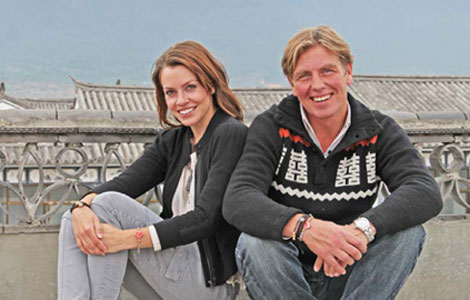Cut above the rest
Updated: 2011-05-13 13:45
By Yang Yijun (China Daily)
One of the world's oldest surgeons has performed more than 14,000 operations
|
|
It's a Saturday morning and chief surgeon Wu Mengchao has just helped remove a 2.5 kg liver tumor from a patient. It is the second operation of the morning for the 89-year-old, the nation's top hepatobiliary surgeon, who was honored with China's highest science award in 2005.
One in two liver cancer patients worldwide are in China, says Wu, the first scientist in the medical field to win the State Preeminent Science and Technology Award.
"We still have a long way to go to improve our liver surgery techniques," says the scientist who donated the prize of 5 million yuan (530,000 euros) to assist his students' research in this field.
A leading cause of liver cancer is hepatitis B, which is endemic in China and other parts of Asia. An estimated 200 million Chinese suffer from liver diseases, including hepatitis B.
Wu's rock steady hands have guided more than 14,000 operations over a 68-year career. His glasses and mop of gray hair are the only signs of his advancing years, the doctor betrays not the slightest trace of hesitation in his capabilities.
"I'm confident of the operation's success," he says as he enters the operation room.
The diminutive Wu, 1.62 meters tall, often has to stand on a stool during surgery. In fact, his lack of height was seen as a possible stumbling block to Wu becoming an effective surgeon in his examining professor's mind when he sat the examination for the department of surgery at medical college.
Born in Fujian province and raised in Malaysia during his youth, Wu is not only a world-famous hepatobiliary surgeon, but also an academic at the Chinese Academy of Sciences, as well as founder and director of the Shanghai-based Eastern Hepatobiliary Surgery Hospital affiliated to the Second Military Medical University.
The first doctor in the country to establish the theoretical basis for liver surgery, he successfully completed a resection of a liver tumor in the 1960s.
|
|
More than 56 percent of his liver cancer patients have lived for at least five years after surgery.
His unique surgical methods have come to be dubbed "Wu's method".
"His operations are quick and accurate. You can hardly see any redundant procedures," says Yan Yiqun, director of the No 1 hepatic department of Wu's hospital, and Wu's student.
Yan explains that this reduces surgery time and also helps the patient to recover faster and live longer.
"Most of the surgery techniques I'm using come from 'Wu's method,"' Yan adds.
In 2005, when he received the top science award, "many people tried to persuade me to retire, but enjoying retired life was not what I wanted", Wu says. "I can't quit this early."
Even at his age, Wu continues to do surgery regularly. He did 196 liver operations in 2010, sometimes two or three in a day, and saw nearly 600 outpatients.
His colleagues and students say Wu is strict about controlling the medical expenses of surgery. For instance, he seldom uses specialized sewing instruments, which cost 5,000 yuan (534 euros) for one-time use, preferring to stitch up wounds with his own hands.
"Professor Wu believes there is no need to use such instruments as long as the doctor takes care while sewing up the wound," says Yang Tian, a doctor in Wu's hospital.
"He always tells us, 'A doctor can help the patient to save that much money by spending just another 10 minutes. Why not do it?'" Yang recalls.
According to Yang, a liver operation in his hospital costs 20,000 yuan on average, surprising many patients who expect costs to exceed 100,000 yuan.
Wu receives more than 20 letters from his patients every day, most of them thank-you notes and greeting cards. He replies to each and every one of them.
His colleagues and patients recall how Wu checks patients on cold days, as he warms his hands in his pockets before touching them.
"Most of my patients have hepatitis, which scares others away. But as a doctor, I must respect and love my patients," he says.
"Doctor Wu has not only saved my life twice, but has followed up on my condition over the years," says Jiang Shenghe, 82, who underwent two liver operations by Wu in 1966 and 1996.
Jiang moved many times after the surgery and even left Shanghai for Jinhua, in Zhejiang province, several years ago. But Wu went to great lengths to find him and invite him for a free health check at his hospital.
"We are old friends now. He even mails New Year cards to me," he says.
In the eyes of his wife, Wu is just an ordinary old man, though a bit of a workaholic.
"Many people wonder what his secret to good health is. But to tell you the truth, his life can't be simpler," says his wife, Wu Peiyu, 89, a professor of gynecology and obstetrics.
"His meals are basically light and simple and he doesn't eat much," she says. Wu usually has a cup of milk and an egg for breakfast and congee and steamed bread for supper. He doesn't have lunch at a fixed time, as he often performs operations from morning till afternoon.
"The only tonic he has is three slices of ginseng every day," she says.
Wu's regular working hours are between 8 am and 6 pm, however, his wife says that although he always goes to work on time, he often returns late.
"If some other hospitals request him to treat patients, he will go there immediately. But if we ask him to go out for a family gathering, he would rather stay at home and work on his articles," she says, adding, "He hardly has any hobbies. Perhaps he only loves surgery."
"I really thank my wife for understanding me and taking good care of the family. Since she is also a doctor, she never blames me for spending too little time at home," Wu says, "I owe her a lot."
His goal now is to achieve five-year survival rates among 80 percent of his patients and reduce the incidence of liver cancer in China by 15 percent in the next five to 10 years.
"Of course I feel tired, but I will keep working as long as I have the energy," he says. "My efforts alone are far from enough to help Chinese people rid themselves of the disease.
"I wish to train more successors to improve our surgery techniques, in the remaining years of my life."
E-paper

Tapping into the future
Foreign companies are investing in China's water industry as many predict a growing profit margin.
Headhunters ride on growth
Commercial property rides wave
Learning from the past
Specials

Cuisine central
London's Chinatown is helping diners appreciate full palate of Chinese food

Tying the knot
Danish couple's high-end macrame export business takes off in the mountains of Yunnan.

Truly a super woman
Li Yuchun first came to prominence in 2005 as the Super Girl winner, and since then has become an international star.


